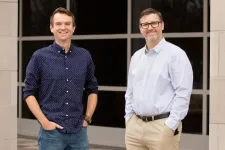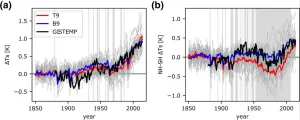Climate change 'winners' may owe financial compensation to polluters
2021-03-03
(Press-News.org) Climate change is generally portrayed as an environmental and societal threat with entirely negative consequences. However, some sectors of the global economy may actually end up benefiting.
New economic and philosophical research argues that policymakers must consider both the beneficial effects of climate change to "climate winners" as well as its costs in order to appropriately incentivize actions that are best for society and for the environment.
The study by researchers from Princeton University, University College Cork, and HEC Montréal appears to be the first to develop a systematic, ethical framework for addressing climate winners -- as well as those harmed -- using financial transfers.
Their approach, called "Polluter Pays, Then Receives," requires polluters to first compensate those most harmed by climate change. Subsequently, polluters would be eligible to receive compensation from those who are passively benefiting from climate change.
Published in Economics & Philosophy, the article emphasizes that, through climate change, greenhouse gas emitters affect a variety of individuals and groups both positively and negatively at different regional or sectoral scales, sometimes at the expense of other groups -- what economists call "externalities."
"With a global issue like climate change, it's difficult for people to make decisions that account for the harm or benefit their actions cause, because those effects aren't directly or proportionally felt by that actor," said study co-author Kian Mintz-Woo, a former postdoctoral research associate at the Princeton University Center for Human Values and the Princeton School of Public and International Affairs. "Our research argues that payments are one way to help correct incentives: Harms should be redressed, and then beneficial actions should be rewarded."
Mintz-Woo recently joined the department of Philosophy and the Environmental Research Institute at University College Cork.
While globally the negative consequences of climate change are expected to far outweigh the benefits, some groups or places may experience net benefits. For example, countries at far northern latitudes or specific industries may see improved agricultural conditions, additional tourism, or lower energy costs.
"Not systematically considering or accounting for beneficial climate effects makes it easier for climate impact skeptics to think that climate change discussions are oversimplified or alarmist," said study co-author Justin Leroux, professor of applied economics at HEC Montréal and CIRANO research fellow. "Another motivation of our study was to address the unfairness that arises when some benefit from climate change while others are suffering harm. It's a question of solidarity -- both sharing benefits that weren't truly earned and compensating losses that weren't the fault of those harmed."
The authors say this compensation approach could be experimented with at a regional or national level before being introduced globally. They explore how it might be implemented in a federal nation using the example of Canada. A national carbon tax could be used to collect funds from greenhouse gas emitters. Those revenues would first and foremost be used to compensate victims. In addition, a corporate tax would be levied on the sectors of the economy that gain passively from climate change, like tourism, which could benefit from more tourists taking advantage of longer summers in Arctic regions. Revenue from the additional corporate tax would be shared with the greenhouse gas emitters. Introducing a policy to reward emitters may sound surprising, but the authors emphasize that those emitters would first need to pay for their harms before receiving any benefit payments.
"Payments from passive winners to polluters could either help the polluters more fully compensate the groups that have been harmed by their actions or help fund the polluters' own climate adaptation responses," Mintz-Woo said.
INFORMATION:
"What do climate change winners owe, and to whom?" was published online Feb. 23. The article is available open access, thanks to support from the Princeton University Library Open Access Fund Program. The research is co-authored by Kian Mintz-Woo (University College Cork and Princeton University) and Justin Leroux (HEC Montréal and CIRANO).
ELSE PRESS RELEASES FROM THIS DATE:
2021-03-03
A recent survey of the approximately 274,000 City University of New York (CUNY) students published in the Journal of Urban Health found that the Covid-19 pandemic has taken a toll on their mental health and financial security.
The population-representative survey, conducted by a team of CUNY SPH faculty in collaboration with researchers at Healthy CUNY, found that more than half of CUNY students (54%) reported experiencing depression and/or anxiety in April 2020, at the height of the first wave of the Covid-19 pandemic. Further, they found disturbingly high levels of financial instability and noted that food insecurity and housing worries were strong ...
2021-03-03
Injecting hydrogels containing stem cell or exosome therapeutics directly into the pericardial cavity could be a less invasive, less costly, and more effective means of treating cardiac injury, according to new research from North Carolina State University and the University of North Carolina at Chapel Hill.
Stem cell therapy holds promise as a way to treat cardiac injury, but delivering the therapy directly to the site of the injury and keeping it in place long enough to be effective are ongoing challenges. Even cardiac patches, which can be positioned directly over the site of the injury, have drawbacks in that they require invasive surgical ...
2021-03-03
CHAMPAIGN, Ill. -- A smartphone app called Harbor, currently under development by researchers at the University of Illinois Urbana-Champaign, teaches young adults how to talk to a peer if they are concerned about that other person's drinking or drug use.
Designed for people ages 18-29, Harbor teaches young adults how they can "act as first responders for their close friends who demonstrate risky substance use behaviors," according to the app's lead developer, social work professor Douglas C. Smith. Smith, the director of the Center for Prevention Research and Development at the U. of I., focuses his ...
2021-03-03
Boulder, Colo., USA: GSA's dynamic online journal, Geosphere,
posts articles online regularly. Topics for articles posted for Geosphere this month include "a tale of five enclaves"; evidence
for mantle and Moho in the Baltimore Mafic Complex (Maryland, USA); and the
after effects of the 1964 Mw 9.2 megathrust rupture, Alaska.
From Ordovician nascent to early Permian mature arc in the southern
Altaids: Insights from the Kalatage inlier in the Eastern Tianshan, NW
China
Qigui Mao; Jingbin Wang; Wenjiao Xiao; Brian F. Windley; Karel Schulmann
...
Abstract:
The Kalatage inlier in the Dananhu-Haerlik arc is one of the most important
arcs in the Eastern Tianshan, southern Altaids ...
2021-03-03
BROOKLYN, New York, Wednesday, March 3, 2021 - Machine-learning (ML) systems are becoming pervasive not only in technologies affecting our day-to-day lives, but also in those observing them, including face expression recognition systems. Companies that make and use such widely deployed services rely on so-called privacy preservation tools that often use generative adversarial networks (GANs), typically produced by a third party to scrub images of individuals' identity. But how good are they?
Researchers at the END ...
2021-03-03
Nature Communications Publishes Paper by Lundquist Institute Investigator Dr. Wei Yan and Colleagues on New Promising Compound for Male Contraceptive Pill
The Lundquist Institute researchers discovered a natural compound that exhibits almost ideal male contraceptive effects in pre-clinical studies
LOS ANGELES (March 3, 2021) -- In a new paper published by Nature Communications, The Lundquist Institute (TLI) Investigator Wei Yan, MD, PhD, and his research colleagues spell out an innovative strategy that has led to the discovery of a natural compound as a safe, effective and reversible male contraceptive agent in pre-clinical animal models. ...
2021-03-03
A recent analysis of the latest generation of climate models -- known as a CMIP6 -- provides a cautionary tale on interpreting climate simulations as scientists develop more sensitive and sophisticated projections of how the Earth will respond to increasing levels of carbon dioxide in the atmosphere.
Researchers at Princeton University and the University of Miami reported that newer models with a high "climate sensitivity" -- meaning they predict much greater global warming from the same levels of atmospheric carbon dioxide as other models -- do not provide a plausible scenario of Earth's future climate.
Those ...
2021-03-03
Inspired by the eyes of mantis shrimp, researchers have developed a new kind of optical sensor that is small enough to fit on a smartphone but is capable of hyperspectral and polarimetric imaging.
"Lots of artificial intelligence (AI) programs can make use of data-rich hyperspectral and polarimetric images, but the equipment necessary for capturing those images is currently somewhat bulky," says Michael Kudenov, co-corresponding author of a paper on the work and an associate professor of electrical and computer engineering at North Carolina State University. "Our work here makes smaller, more user friendly devices possible. And that would allow us to better bring those AI capabilities to bear in fields from astronomy to biomedicine."
In the context of this research, ...
2021-03-03
Researchers have analyzed tracking data for 5,775 birds across 39 species of albatrosses and large petrels -- threatened seabirds whose ranges span many countries and the high seas -- to estimate how responsibility for their protection should be distributed among nations and international organizations. The authors note that albatrosses and large petrels from all breeding countries spend much of their time on the high seas, indicating that effectively managing these waters is of global interest. These estimates are critical to inform ongoing United Nations discussions to design a global treaty for conserving biodiversity in the high seas, beyond national jurisdictions, the authors write. Many species of albatrosses and ...
2021-03-03
CHAPEL HILL, N.C. - First-year college students are reporting symptoms of depression and anxiety significantly more often than they were before the coronavirus pandemic, according to a study by the University of North Carolina at Chapel Hill.
The study, embargoed for release until March 3, 2021, at 2 p.m. EST, in the journal PLOS ONE, is based on surveys of 419 Carolina students, and reflects the challenge of colleges nationwide to support student well-being.
The study is unique among the growing reports of COVID-19's toll on mental health: researchers followed the ...
LAST 30 PRESS RELEASES:
[Press-News.org] Climate change 'winners' may owe financial compensation to polluters



